Ultra fans file class action suit over no-refund policy after COVID-19 cancellation
Ultra Music Festival faces a class-action lawsuit filed on behalf of ticket holders who paid hundreds of dollars to attend the event but did not receive refunds after this year’s festival was effectively canceled as the COVID-19 pandemic began to disrupt life in South Florida.
The Miami city government’s agreement with the electronic dance music festival allowed organizers to stage the three-day event at Bayfront Park in March. When the fears over the spread of the novel coronavirus caused local governments to cancel large events and eventually shut down the local economy, Ultra was among the first events taken off the calendar.
Organizers and the city insisted the festival had not been canceled, simply “postponed” for a full year, and organizers refused to issue refunds. Most tickets cost several hundred dollars, depending on when they were purchased, with VIP tickets selling for $1,500.
Instead, people could receive credits for either the 2021 or 2022 event in Miami — even though, at this point, those events are not even guaranteed under Ultra’s contract. Miami commissioners have yet to consider approving a deal to bring the festival back in 2021.
That decision, whenever it is made, will be set against a backdrop of uncertainty over the future of large-scale events in Miami and persistent opposition from downtown condo dwellers who say Ultra poses a threat to their health and hearing, disrupts their enjoyment of Bayfront Park and creates a nuisance right outside their homes.
Now, angry ticket buyers have joined the melee. The lawsuit, filed Tuesday in U.S. District Court’s Southern District of Florida, contends that people who purchased tickets to the 2020 festival are entitled to refunds and that keeping ticket holders’ money is “unjust and inequitable.”
A Miami resident, Samuel Hernandez, and Richard Montoure, of Washington state, are suing on behalf of fellow would-be Ultra attendees. Hernandez paid $3,000 for six tickets, according to the complaint. He claimed the credit for a future festival on two of those tickets on May 20 so he didn’t completely lose the value of his purchase. He never got the refund he requested on the other four.
Montoure, who bought a pair of three-day passes for a little over $1,000, also inquired about a refund because he does not plan on attending future festivals. He got no response, according to the lawsuit. Without any other options, Montoure claimed the benefits on his two tickets, thought he kept receiving emails about deadline extensions for people to decide if they wanted to attend future festivals.
The lawsuit seeks to secure full refunds, with interest, for ticket-holders.

“We understand that the COVID-19 pandemic has impacted every part of the global economy but we do not believe that gives the Ultra Music Festival the right to shift the burden of this extraordinary crisis onto its customers, who, in some cases, paid hundreds of dollars to attend this festival and now the COVID-19 pandemic has or will preclude them from ever using any credit,” said Joe Sauder of law firm Sauder Schelkopf. “We look forward to seeking to recover cash refunds for our clients and the class members.”
On Wednesday, Ultra did not respond to a request for comment on the lawsuit, which was first reported by Rolling Stone.
Ticket buyers received emails late March 9 telling them they could use their tickets to enter one of two future festivals, along with a list of benefits that included discount codes for merchandise and other ticket packages. The email did not mention refunds.
Ultra gave fans 30 days to choose which future event they wanted to attend, according to the lawsuit. The deadline has been extended multiple times.
Ultra’s refund policy, outlined in its terms and conditions, state the festival reserves the right to offer a refund, a partial refund or none at all. According to the terms, even when an event is canceled by an external force, such as government action, then the festival can be “postponed,” refunds are up to Ultra’s discretion and the festival can offer other goods to make it up to the purchaser.
That lawsuit contends these terms and conditions should be void because they constitute an “unenforceable unilateral option contract.”

The lawsuit compounds an already thorny situation for the festival. Aggravated residents have sued the city over Ultra, accusing city administrators of violating the city charter, permitting an illegal nuisance and defying Miami’s public bidding laws to approve a license agreement with the festival. That lawsuit, filed before the pandemic, is pending in circuit court.
Miami commissioners are expected to discuss Ultra at their June 11 meeting. A vote for the city to allow Ultra’s return in 2021 and 2022 was scheduled for April 9 but was deferred.
Mayor Francis Suarez said even June might be too soon to have a discussion on whether Ultra or any other large event can come back to Miami, a point that is echoed by many residents who fear a large aggregation of people in downtown.
“I doubt that in a month we’re going to be ready to have that conversation,” Suarez said.
Read the full class-action lawsuit below:
Class action lawsuit against Ultra Music Festival by Joey Flechas on Scribd

